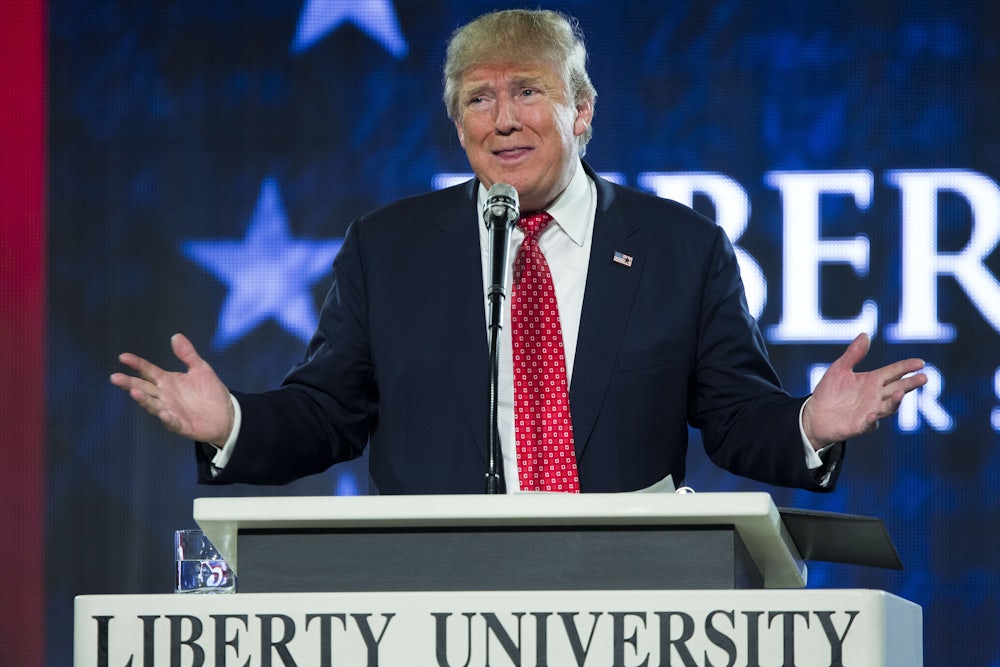The list of Republican senators, governors, and congressmen and women who have announced they’ll no longer vote for Donald Trump has grown to 46 as of Sunday morning. Yet the religious right hangs on. Conservative evangelicals, who form the core of the movement’s contemporary iteration, told various outlets this weekend that they still back the GOP nominee, despite Friday’s publication of a video in which Trump justifies sexual assault.
Tony Perkins, who heads the Family Research Council, told The Washington Post that he still backs Trump because he can’t “allow the country and culture to deteriorate” any further. Another prominent evangelical, Gary Bauer, told Reuters that the alternative is worse: Hillary Clinton, he argued, will “erode religious liberty” and “promote abortion,” among other sins. Rev. Robert Jeffress, an early Trump supporter, also said in a statement that Trump is still “the best candidate to reverse the downward spiral this nation is in.”
James Dobson, founder of Focus on the Family, even subtweeted Trump’s critics last night:
Lord, You have spoken plainly about the consequences of withholding forgiveness. Help us to hear You and obey. Amen.
— Dr. James Dobson (@DrJamesCDobson) October 8, 2016
And Sean Hannity, a Catholic who shares much in common with his evangelical brethren, compared Trump to King David on his Friday night show. But Donald Trump is not the King David Christians are looking for, and crowning him will cost them the political and cultural influence they’ve fought so hard to gain.
Rewind to Friday morning: We already knew that Trump was a racist. We also knew that he was a misogynist. We knew that he had humiliated Miss Universe Alicia Machado for her ethnicity and weight, and allegedly sexually harassed women on the set of The Apprentice. We knew that he’d repeatedly called women “fat pig” and “dog”; that he’d been accused of sexual assault; that he’d speculated about Megyn Kelly’s menstrual cycle on live television; that he’d said disturbing things about his daughter’s sexuality. The religious right still endorsed him.
Doing so made a certain pragmatic sense at the time. It guaranteed the movement leverage, which its operatives used to get Mike Pence on the Trump ticket. This also forced Trump to play Christian, which reinforced the conflation of Republican politics and religious values. But the game was only ever going to work if Trump managed to keep up the act—and that was about as likely as Franklin Graham endorsing Clinton.
Among his hardcore fans, Trump will survive these scandals; his supporters are now making that clear to his detractors. But his pious boosters can’t count on the same. Trump’s principal appeal to voters is his devotion to capitalism, not God. The religious right, meanwhile, pins itself to a claim of moral superiority. It always had more to lose.
Some evangelicals, like the Southern Baptist Convention’s Russell Moore, understand this, and have publicly criticized Trump’s convenient conversion. But their voices were never enough to sway the rank-and-file. The religious right was never as unique as it wanted everyone to believe, and now Trump has revealed the movement’s superiority to be the ruse it’s always been.
The religious right isn’t dead yet. But after this election becomes history, the movement will be forced to reckon with the consequences of its quest for power. Young adults, who overwhelmingly oppose Trump, are already leaving conservative churches, and the religious right’s Trump moment will surely only fuel this trend. If it had maintained a consistent public morality, maybe it could have retained some countercultural appeal. Now that its most visible leaders have sacrificed that authority, it has nothing left.
The statements of Perkins et al may well be considered their movement’s suicide note. Who will now believe they care for the sanctity of so-called “traditional marriage?” They anointed an infamous philanderer their standard-bearer. And who will believe they oppose abortion because they care for women? They backed a man who thinks sexual assault makes a good joke. Generations will remember their support for one of the most publicly misogynist and racist presidential candidates in American history.
In the Gospel of Matthew, Christ tells his disciples that no one can serve two masters; you’ll be loyal to one and not to the other. By endorsing Trump, the religious right chose a master—and sacrificed everything it says it stands for.
